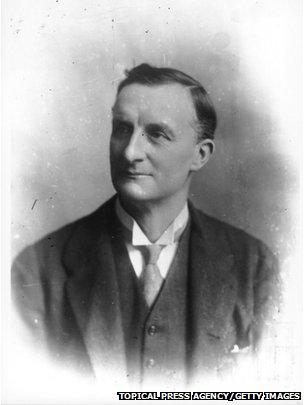WW1: The war to end all wars? What our MPs thought
- Published
- comments
.jpg)
So just imagine what it must have been like 100 years ago, as the prime minister of the day Herbert Asquith faced the prospect of Britain at war with Germany.
HH Asquith was prime minister of a coalition government in 1914. Sound familiar?
He led a Liberal government in coalition with the Irish Parliamentary Party. The Conservatives and their leader Andrew Bonar Law were the main opposition.
There was an economic and banking crisis. There was pressure for devolution and independence - not for Scotland, the issue was home rule for Ireland.
Remember also that Dublin not Birmingham was Britain's second city then. And our MPs were more concerned about the prospect of civil war in Ireland, than the drum beat to war in continental Europe.
That all changed when Sir Edward Grey, the Foreign Secretary, went to the House of Commons on 3 August to warn MPs: if the Kaiser's army swept through Belgium to attack Paris, Britain would be obliged to defend Belgium's neutrality.
"If Belgium is compelled to submit to allow her neutrality to be violated, of course the situation is clear," he told MPs.
"Their one desire is that they should be left alone and independent."
An MP from Leicester wasn't convinced of the need for war and told him so.

Ramsay MacDonald is probably better known now as Labour's first ever prime minister in the government he formed in 1924. He was also one of the country's first ever Labour MPs, elected to represent Leicester in 1906. As war approached, he warned of the dangers.
In the Commons, Ramsay MacDonald told Sir Edward Grey he wasn't convinced that Britain had to get involved. And that history may eventually agree with him and not Sir Edward and the coalition government.
"I think the verdict of history will be that they are wrong. We shall see," he said.
Britain declared war against Germany 24 hours later. Its ultimatum to the Kaiser's government in Berlin - to pull its troops out of Belgium - had expired at 11pm.
Sir Edward Grey, looking out from the windows of the Foreign Office, made his now prophetic warning: "The lamps are going out all over Europe; we shall not see them lit again in our lifetime."
Mobilisation wasn't without its problems. Lord Kitchener needed recruits. The first weekend saw 60,000 recruits sign up.
But that was later to provoke the fury of Mansfield's MP Arthur Markham, a Liberal. He gained national prominence for his campaign against under-age boys being enlisted. In Leicester, recruitment was among the lowest in Britain because of the strong anti-war sentiment.
Other East Midland MPs had more practical concerns: why had recruits, after a month in the Army, not been provided with razors and spoons, So asked the Nottingham South Tory MP Lord Henry Cavendish-Bentinck.
Why were retired medical officers called up to the Army not getting a full kit and pay allowance, Sir Herbert Raphael, Liberal MP for Derbyshire South wanted to know.
Rutland's Conservative MP John Gretton spoke out against the first wave of restricting the opening hours of pubs. The Home Office was anxious about soldiers getting drunk.
And one of Derby's new Labour MPs Jimmy Thomas exposed businesses that were still trading with the Kaiser's Germany, despite a government trade ban.
The war to end all wars may have been 100 years ago . But somehow, the concerns of our MPs then seem strangely familiar even now.